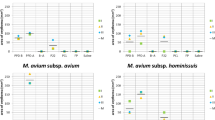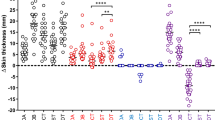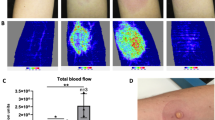Abstract
DELAYED, or tuberculin-type, sensitivity occurs in the course of many bacterial infections. It is characterized by skin reactions appearing with 24–48 hr. after intracutaneous injections of bacteria or their soluble products. Like immunological reactions, delayed skin reactions are highly specific, but the products eliciting the reactions need not be antigenic per se. Circulating antibodies have not been demonstrated to play a part. Delayed sensitivity is not transferable passively by serum, but can be transferred with the cells of sensitized organisms.
This is a preview of subscription content, access via your institution
Access options
Subscribe to this journal
Receive 51 print issues and online access
$199.00 per year
only $3.90 per issue
Buy this article
- Purchase on Springer Link
- Instant access to full article PDF
Prices may be subject to local taxes which are calculated during checkout
Similar content being viewed by others
References
Raffel, S., J. Infect. Dis., 82, 267 (1948).
Braude, A. I., “A Comparison of Sensitivity to Tuberculin and Bacterial Endotoxin by means of Isotopes”, Ann. Rep. Research and Development Division, Office of the Surgeon General, October 31, 1958, pp. 27–52 (Department of the Army, Washington 25, D.C.).
Ovary, Z., Prog. Allergy, 5, 459 (1958).
Author information
Authors and Affiliations
Rights and permissions
About this article
Cite this article
BLOCH, H., NORDIN, A. Production of Tuberculin Sensitivity. Nature 187, 434–435 (1960). https://doi.org/10.1038/187434a0
Issue Date:
DOI: https://doi.org/10.1038/187434a0
This article is cited by
-
Variations in the Rate of Induction of Chemical Carcinogenesis According to Differing Psychological States in Rats
Nature (1964)
-
Der Mechanismus der Tuberkulincytolyse
Zeitschrift für Hygiene und Infektionskrankheiten (1964)
Comments
By submitting a comment you agree to abide by our Terms and Community Guidelines. If you find something abusive or that does not comply with our terms or guidelines please flag it as inappropriate.



